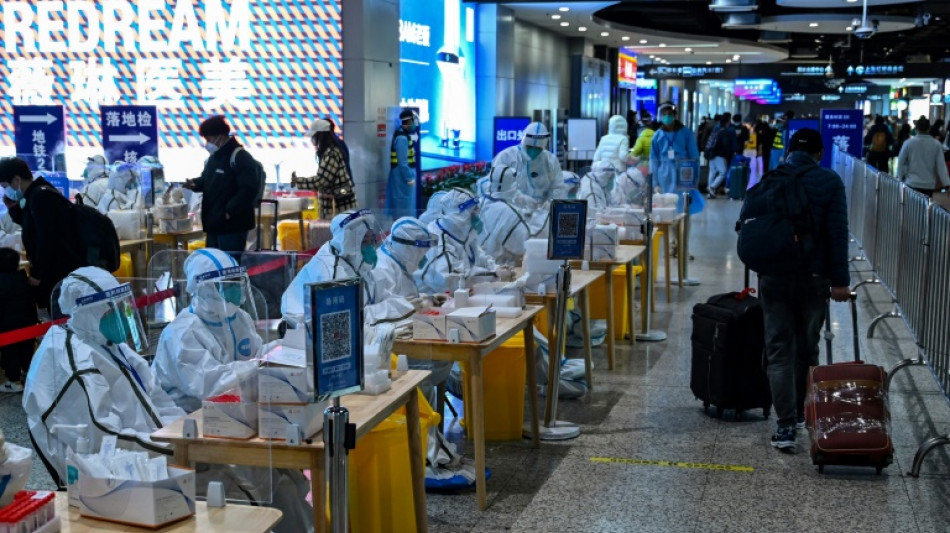
-
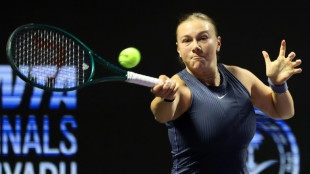 Anisimova beats Swiatek to reach WTA Finals last four
Anisimova beats Swiatek to reach WTA Finals last four
-
US Supreme Court appears skeptical of Trump tariff legality

-
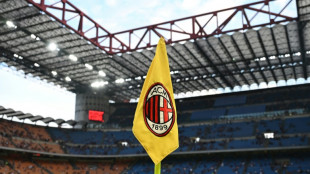 AC Milan post third straight annual profit on day of San Siro purchase
AC Milan post third straight annual profit on day of San Siro purchase
-
Angelina Jolie visits Ukrainian frontline city, media reports say

-
 UN says forests should form key plank of COP30
UN says forests should form key plank of COP30
-
Star designer Rousteing quits fashion group Balmain

-
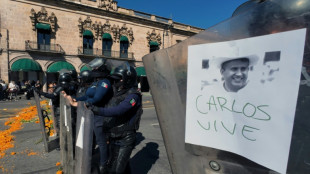 Mexico's Sheinbaum steps up cartel fight after murder of anti-narco mayor
Mexico's Sheinbaum steps up cartel fight after murder of anti-narco mayor
-
Attack on funeral in Sudan's Kordofan region kills 40: UN
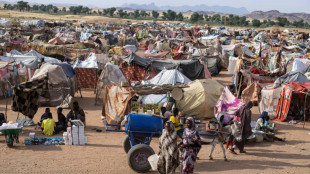
-
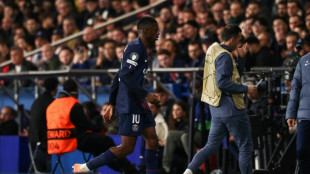 Key PSG trio set for spell on sidelines
Key PSG trio set for spell on sidelines
-
Democrats punch back in US elections - and see hope for 2026
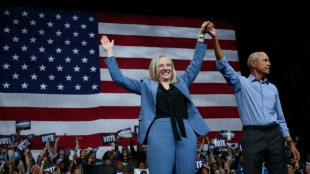
-
 BMW reports rising profitability, shares jump
BMW reports rising profitability, shares jump
-
Bolivia Supreme Court orders release of jailed ex-president Jeanine Anez
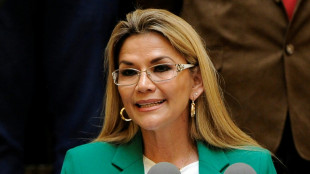
-
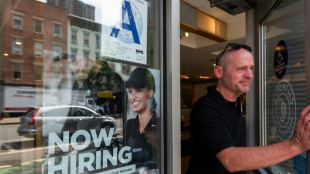 Wall Street stocks rise after positive jobs data
Wall Street stocks rise after positive jobs data
-
'Hostage diplomacy': longstanding Iran tactic presenting dilemma for West
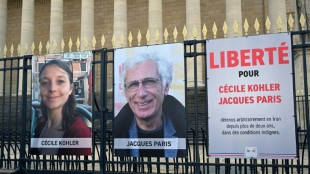
-
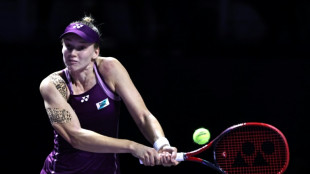 Rybakina stays perfect at WTA Finals with win over alternate Alexandrova
Rybakina stays perfect at WTA Finals with win over alternate Alexandrova
-
Le Garrec welcomes Dupont help in training for Springboks showdown

-
 Brussels wants high-speed rail linking EU capitals by 2040
Brussels wants high-speed rail linking EU capitals by 2040
-
Swiss business chiefs met Trump on tariffs: Bern
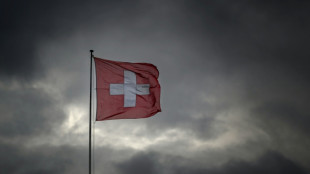
-
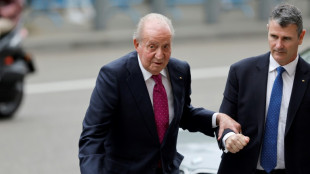 Spain's exiled king recounts history, scandals in wistful memoir
Spain's exiled king recounts history, scandals in wistful memoir
-
Wall Street stocks steady after positive jobs data
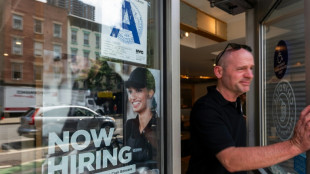
-
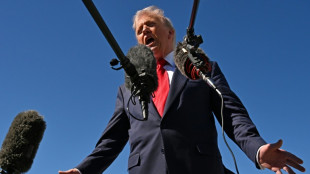 Trump blasts Democrats as government shutdown becomes longest ever
Trump blasts Democrats as government shutdown becomes longest ever
-
Indian pilgrims find 'warm welcome' in Pakistan despite tensions

-
 Inter and AC Milan complete purchase of San Siro
Inter and AC Milan complete purchase of San Siro
-
Swedish authorities inspect worksite conditions at steel startup Stegra

-
 Keys withdraws from WTA Finals with illness
Keys withdraws from WTA Finals with illness
-
Prince Harry says proud to be British despite new life in US

-
 EU strikes last-ditch deal on climate targets as COP30 looms
EU strikes last-ditch deal on climate targets as COP30 looms
-
Stocks retreat as tech bubble fears grow

-
 Shein opens first permanent store amid heavy police presence
Shein opens first permanent store amid heavy police presence
-
West Indies edge New Zealand despite Santner brilliance

-
 French pair released by Iran await return home
French pair released by Iran await return home
-
German factory orders up but outlook still muted

-
 Death toll tops 100 as Philippines digs out after typhoon
Death toll tops 100 as Philippines digs out after typhoon
-
Attack on key city in Sudan's Kordofan region kills 40: UN

-
 'No one could stop it': Sudanese describe mass rapes while fleeing El-Fasher
'No one could stop it': Sudanese describe mass rapes while fleeing El-Fasher
-
Champagne and cheers across New York as Mamdani soars to victory

-
 Medieval tower collapse adds to Italy's workplace toll
Medieval tower collapse adds to Italy's workplace toll
-
BMW boosts profitability despite China, tariff woes

-
 South Africa's Wiese wary of 'hurt' France before re-match
South Africa's Wiese wary of 'hurt' France before re-match
-
Beyond limits: Croatian freediver's breathtaking record

-
 Tottenham supporting Udogie after alleged gun threat in London
Tottenham supporting Udogie after alleged gun threat in London
-
Thunder roll Clippers to stay unbeaten as SGA keeps streak alive

-
 In appeal, Australian mushroom murderer alleges 'miscarriage of justice'
In appeal, Australian mushroom murderer alleges 'miscarriage of justice'
-
Toyota hikes profit forecasts 'despite US tariffs'

-
 Ex-France lock Willemse challenges Meafou to become 'the bully'
Ex-France lock Willemse challenges Meafou to become 'the bully'
-
Ukrainians to honour sporting dead by building country they 'died for': minister

-
 At least 7 dead after UPS cargo plane crashes near Louisville airport
At least 7 dead after UPS cargo plane crashes near Louisville airport
-
US Supreme Court hears challenge to Trump tariff powers

-
 US government shutdown becomes longest in history
US government shutdown becomes longest in history
-
India's Modi readies bellwether poll in poorest state


Pandemic treaty plans thrashed out at WHO
Negotiators are meeting in Geneva this week to thrash out a pandemic treaty aimed at ensuring the flaws that turned Covid-19 into a global crisis could never happen again.
As the third anniversary of the virus emerging rolls around, negotiators are raking over an early concept draft of what might eventually make it into an international agreement on how to handle future pandemics.
"The lessons of the pandemic must not go unlearned," WHO chief Tedros Adhanom Ghebreyesus told the negotiating panel at the start of three days of talks, which conclude on Wednesday.
An intergovernmental negotiating body is paving the way towards a global agreement that would regulate how nations prepare for and respond to future pandemic threats.
They are huddled in Geneva for their third meeting, refining and going over their ideas so far.
A progress report will be put before WHO member states next year, with the final outcome presented for their consideration in May 2024.
The dense, 32-page early draft "is a true reflection of the aspirations for a different paradigm for strengthening pandemic prevention, preparedness, response and recovery," said Tedros.
The so-called conceptual zero draft contains various notions, some of which will have to be developed and others thrown out as negotiators hone down the text ahead of the next meeting in February.
The trick will ultimately be finding the balance between something bold and with teeth, and something all countries can agree to.
- 'Don't blow this opportunity' -
"There's a lot of material currently that probably doesn't belong in there," said Pamela Hamamoto, the lead US negotiator.
"There's a lot that needs to change before we're going to sign onto it. That is the same for a lot of member states -- probably most," she told reporters.
Hamamoto said Washington wanted to see transparency fixed into the accord, along with better surveillance and rapid response, plus swift and comprehensive data sharing.
The United States also wants to see more equitable access to medical countermeasures, possibly through regional manufacturing.
"A pretty broadly-held view is that we need to make sure that the process is set up right so... we basically don’t blow this opportunity to put together an accord that is going to be meaningful and implementable," Hamamoto said.
The Panel for a Global Public Health Convention, an independent coalition of statespeople and health leaders, said the conceptual draft did not go far enough, despite its bright spots.
The panel said more should be done to establish accountability and clear timelines for alert and response to avoid damaging consequences when an outbreak emerges.
- Negotiations at 'crossroads' -
The medical charity Doctors Without Borders said the negotiations must not overlook the role of clinical trials in any pandemic response.
Mohga Kamal-Yanni, of the NGO coalition People's Vaccine Alliance, said the draft showed negotiations were "at a crossroads".
"A treaty could break with the greed and inequality that has plagued the global response to Covid-19, HIV/AIDS and other pandemics. Or, it could tie future generations to the same disastrous outcomes," she said.
"Governments must resist any attempts to turn a pandemic treaty into another obscene profit opportunity for pharmaceutical companies."
Three years in, the pandemic still has power to disrupt lives and societies -- as seen in the recent unrest in China over lockdowns.
Countries have reported 6.6 million deaths to the WHO, while around 640 million confirmed cases have been registered.
But the UN health agency says this will be a massive undercount.
Global Fund executive director Peter Sands told reporters last month that "having a nice treaty... will have only a partial impact on how effectively we respond".
He said the world was undoubtedly already better prepared for the next pandemic, but warned: "That doesn't mean we are well prepared. It just means we're not as badly prepared as we were before."
S.Keller--BTB




